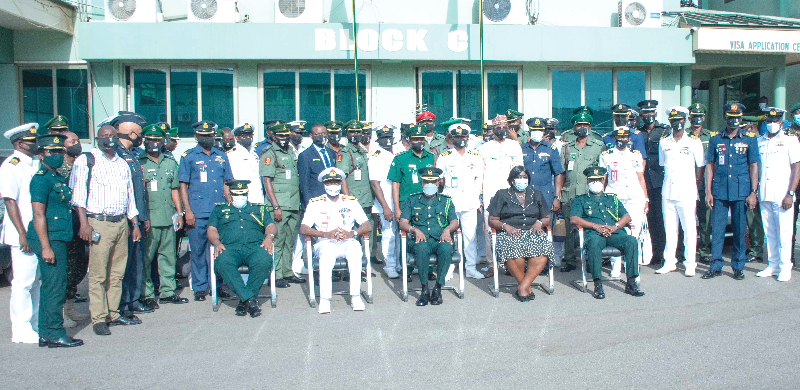
Immigration Service calls for more collaboration to tackle security threat in W/A
The Comptroller-General of the Ghana Immigration Service, Mr Kwame Asuah-Takyi, has stressed the need for more collaboration to counter security threats across the West Africa sub-region.
He said sustained security was vital for the economic development and prosperity of any nation and, therefore, “no government can neglect investing in its security agencies.”
Mr Asuah-Takyi was addressing a workshop for senior military officers of the Nigerian Armed Forces Command and Staff College at the GIS as part of their study tour of the country.
Workshop
The workshop formed part of the schedule of the 49 Officers drawn from Nigeria, South Africa, Togo and Tanzania.
The participants were taken through the mandate, structure, functions and regulatory framework of the GIS.
They were also briefed on various threats at the country’s borders, including strategic responses to mitigate such threats and the benefits of international collaboration in border management and the fight against cross-border crimes.
Maritime insecurity
Mr Asuah-Takyi also bemoaned the insecurity situation at maritime borders within the sub-region, saying the Gulf of Guinea alone accounted for 43 per cent of maritime crime in the world.
“Piracy on high seas is on the ascendency, thus, greatly affecting international trade,” he said, adding that it was for this reason that countries needed to collaborate more to fight such menace since it was nearly impossible for a single country to carry the burden.
A Deputy Comptroller-General, Command Post and Operations (DCGI/OPS), Mr Laud Afrifa, also said while many unapproved routes at land borders posed challenges, the situation was further complicated by the COVID-19 pandemic due to the porous nature of borders across West Africa.
“Though there was a consensual closing of borders across West Africa, we all faced the menace of illegal migrants and the possibility of importing the virus through our borders,” he said.
Mr Afrifa also said it would be a failed effort if the fight against cybercrime was considered xenophobic.
The Deputy Comptroller-General recommended that countries acknowledged that it was in their best interest to join forces to fight against cross-border crime because criminals were becoming more sophisticated in their activities.
He described the study tour as useful since it would enable the officers to learn at firsthand what pertained in the country.
Appreciation
The leader of the delegation who is the Director of Maritime Warfare, Armed Forces Command and Staff College in Jaji, Nigeria, Commodore Kehinde John Odubanjo, expressed appreciation to the GIS for the warm reception accorded them and the experience shared in border management, and the fight against cross-border crimes which he said had given them more insight into those issues.
He also acknowledged the need for intelligence and knowledge sharing in tackling insecurity in the sub-region given the similarity in challenges countries faced.
Commodore Odubanjo further called for continuous collaboration, particularly, between Ghana and Nigeria because of the roles they played in the sub-region.
